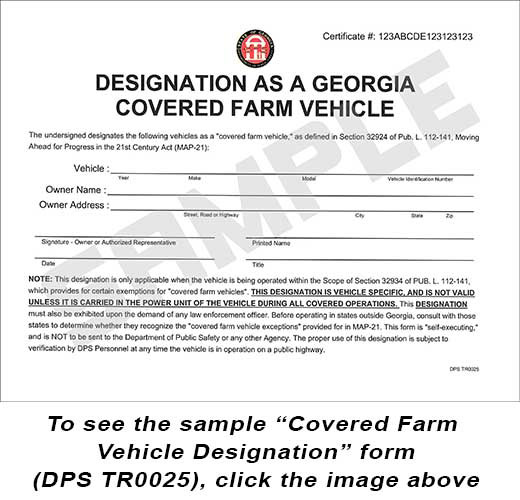MAP-21 CDL Farm Exemptions
On July 6, 2012, the President signed into law the “Moving Ahead for Progress in the 21st Century Act” (MAP-21). MAP-21 makes positive changes to the current exemption that farmers have for hauling agricultural commodities to and from market.
Previously, federal law only exempted farmers and farm helpers from the requirement to have a commercial driver’s license (CDL) while operating within 150 air-miles radius of the home farm. The MAP-21 exemption broadens this exemption by expanding the geographic area in which covered farm vehicles may be operated. The new law allows for farmers to haul farm related commodities anywhere within the state of Georgia and up to 150 miles from the producer’s farm outside the state.
Under federal requirements, a producer must carry a special tag or distinction on the vehicle in order to take advantage of the MAP-21 CDL exemption. Over the last couple of months, Georgia Farm Bureau has worked with the Georgia Department of Public Safety (DPS) to make sure that acquiring this special designation is easy and free of charge.
DPS has created a “Covered Farm Vehicle Designation” form (DPS TR0025), which can be accessed by visiting this website.
Note: This form must be completed online.
The DPS TR0025 Form will require the Vehicle Identification Number (VIN) in order to complete. The completed form MUST be carried in the power unit of the covered farm vehicle during all operation and MUST be available for inspection by law enforcement personnel to obtain this exemption.
For additional information please click here.
MAP-21 CHECK-LIST
EXEMPTION
• A “Covered Farm Vehicle” is a vehicle that:
1. Is operated by a farm owner, or an employee or family member of the farmer.
2. Transports agricultural commodities, livestock or machinery or supplies to and from a farm or ranch.
3. Is NOT operated for-hire (hauling for others for compensation).
4. Must NOT transport hazardous materials in quantities requiring the display of hazardous material warning placards.
• 26,000 pounds or less can be operated anywhere in the U.S. under the MAP-21 Exemption.
• Between 26,000-80,000 pounds can be operated anywhere in Georgia. Such vehicles may also be operated across state lines within 150 miles of the farm or ranch.
• Although the MAP-21 exemption allows for travel into other states, other states may not immediately adopt and implement the exemptions in the same way. Be sure to know the regulations before entering other states.
MAP-21 FARM EXEMPTION, WITH A REGISTERED COVERED FARM VEHICLE
• No CDL is required
• No alcohol or drug testing required
• No physical examination and Medical Examiner’s Certificate needed (Medical Card)
• Hours of service regulations do not apply (Log Book)
REQUIRED (Farmers are not exempt from)
- “Covered Farm Vehicle Designation” form (DPS TR0025)
- MAP-21 does not exempt Covered Farm Vehicles from size and weight restrictions. Farm vehicles must abide by posted weight and load limits on roads and bridges.
- Covered Farm Vehicles remain subject to inspection by commercial vehicle enforcement officers and other law enforcement personnel. Vehicles must enter weight and inspection stations when they are open.
- MAP-21 does not exempt Covered Farm Vehicles from registration, fuel tax and vehicle marking requirements.
- MAP-21 does not exempt Covered Farm Vehicles from roadside inspections. Vehicle parts and accessories must be maintained.
- Operator of a Covered Farm Vehicle must be 16 years of age.
- U.S. DOT number is required.
- Although operators of a Covered Farm Vehicle are not required to hold a CDL, a Georgia operator is still required to have either a Class E or Class F license.
- Class E – Any combination of vehicles with a GVWR of 26,001 pounds or more, provided the GVWR of the vehicle(s) being towed is in excess of 10,000 pounds
- Class F – Any single vehicle with a GVWR of 26,001 pounds or more, or any such vehicle towing a vehicle with a GVWR, not in excess of 10,000 pounds.
